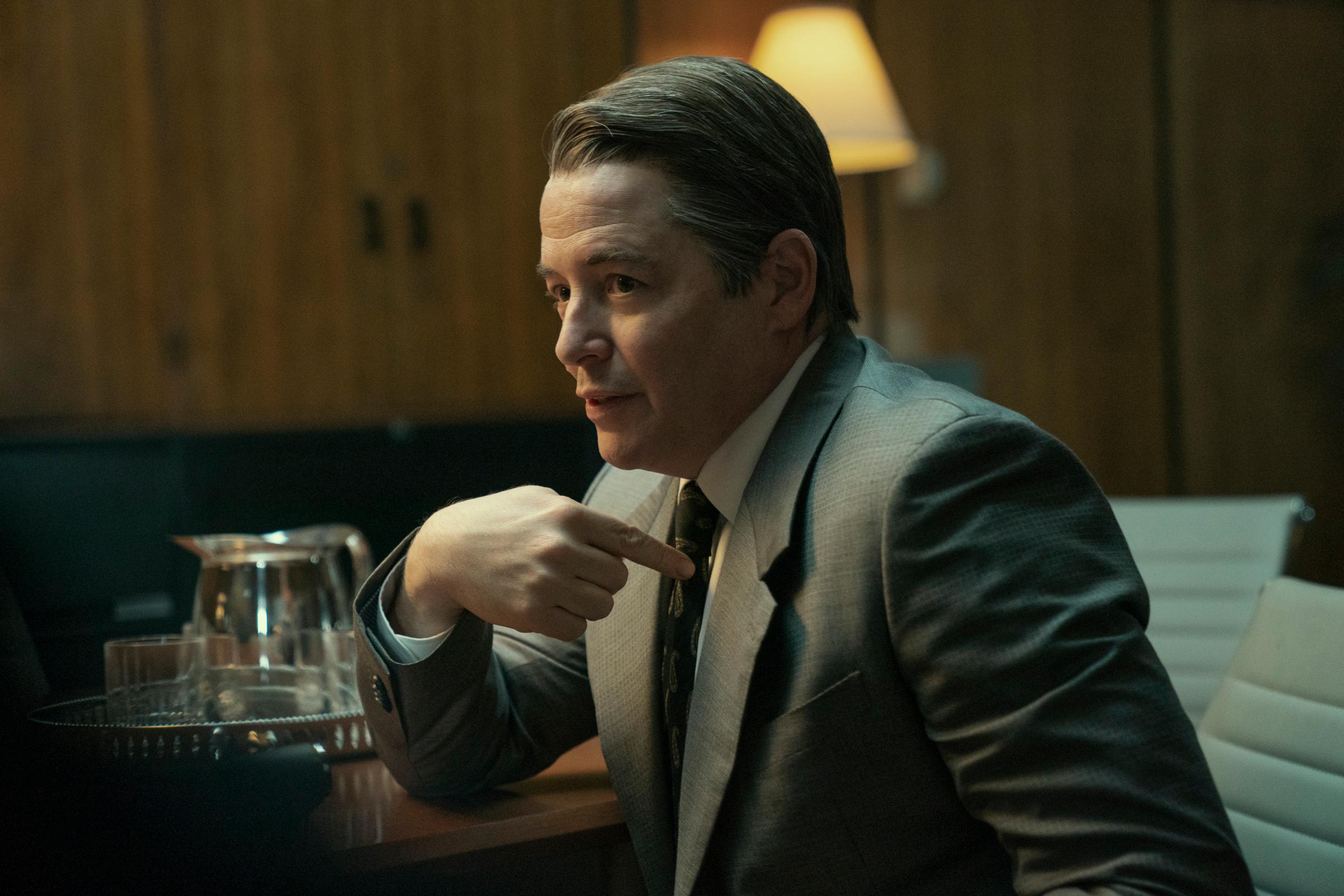The most poignant moments of Netflix’s OxyContin docudrama Painkiller come at the very beginning of each episode. Instead of getting the standard disclaimer out of the way with onscreen text clarifying that some aspects of the show have been fictionalized, the creators recruited parents who lost children to opioids to read it. Then they tell their stories, of young adults cut down in the prime of their lives, often after years of addiction. There are real tears that reflect real grief and set the stage for one the darkest American stories of the last few decades.
Painkiller, arriving Aug. 10, never approaches the power of those prefaces. Backed by an all-star team of executive producers that includes series director and Friday Night Lights creator Peter Berg, Narcos showrunner Eric Newman, prolific documentarian Alex Gibney, and Empire of Pain author Patrick Radden Keefe, the six-part miniseries from Transparent alums Micah Fitzerman-Blue and Noah Harpster is too busy scrambling to convey the facts of the OxyContin saga to do justice to any particular human story. Like a sharper, more technically polished second draft of Hulu’s overstuffed 2021 opioid-crisis ensemble piece Dopesick, it suffers from many of the problems inherent to a genre that’s becoming increasingly popular in Hollywood: the explainer drama.

Based on Keefe’s New Yorker exposé “The Family That Built an Empire of Pain” and the book Pain Killer by Barry Meier, Painkiller presents a prismatic view of the devastation wrought by OxyContin over the past quarter-century. The villain, of course, is Matthew Broderick’s lonely, weirdo billionaire Dr. Richard Sackler, who oversaw the creation and marketing of the drug as a supposedly non-addictive miracle pain medication—and a cash cow for his family’s company, Purdue Pharma. Sackler’s victim, a stand-in for the millions of Americans addicted to opioids, is Glen Kryger (Taylor Kitsch), a North Carolina auto-shop owner and family man who is prescribed the drug after an accident on the job. Connecting pharmaceutical mogul with end user is Shannon Schaeffer (West Duchovny), a bright-eyed, beautiful recent college grad who takes a job as a Purdue rep, earning big commissions by convincing doctors to prescribe Oxy.
Our hero, who also functions as the story’s narrator, is a bureaucrat named Edie Flowers. A U.S. Attorney’s Office lawyer, played by Uzo Aduba as a no-nonsense straight arrow who pays exacting attention to detail, Edie is called in years after her own investigation into Purdue to advise a team prosecuting a case that consolidates hundreds of local lawsuits against the company. She’s skeptical; after all, her own work resulted in barely a slap on the wrist for the Sacklers. But she shares what she knows, unfurling a tale that begins with Richard’s uncle Arthur Sackler’s move from clinical psychiatry to the pharmaceutical industry as new medications like Thorazine started to displace old treatments like the lobotomy. What Richard gleaned from Arthur, Edie explains, was an understanding of the crucial role sales and marketing would play in the pharmaceutical revolution. Hence the Shannon Schaeffers of the world, peddling the lie that less than 1% of patients treated with OxyContin would get addicted.

Painkiller is much more propulsive than the punishingly dour Dopesick, though it derives some of that momentum from a quick-cutting aesthetic that creates the exhausting impression that the camera itself is having periodic panic attacks. Aduba wisely plays Edie as Richard’s rightful nemesis, another odd duck of a very different feather. The scene where the two finally meet is exhilaratingly awkward. Kitsch, who made his name as Texas good ol’ boy Tim Riggins in Friday Night Lights, re-teams with Berg to create a character who feels appropriately like an older, more broken version of that futureless football-hero character. Fitzerman-Blue and Harpster do an impressive job of limiting the number of characters that viewers need to keep straight.
But confusion is inevitable with a story that is constantly hopping from one place and time to another. There’s some tension between the show’s barrage of factual exposition—about the FDA, Purdue’s marketing campaigns, decades’ worth of legal battles over OxyContin, etc.—and its reliance on so many composite characters. Burdened with representing Purdue’s entire promotional apparatus, the intermittently principled Shannon progresses from innocent coed to bubbly superstar sales rep to sexual-coercion victim to opioid dabbler to reluctant whistleblower. Everything bad that has ever happened to a person prescribed OxyContin, it seems, eventually befalls Glen. One sequence contrasts the stereotypical image of him writhing on a dirty mattress in withdrawal with Shannon sampling her own wares at a Purdue party in Miami. Real Congressional testimony mingles with scripted dialogue.

This is the problem with the explainer drama, as popularized by The Big Short and Vice mastermind Adam McKay and imported to TV via shows like Uber origin story Super Pumped and behind-the-scenes Watergate romp White House Plumbers. It’s almost always too focused on exposing real wrongdoing to deliver believably complex characters, real or imaginary. At the same time, it’s too beholden to the narrative demands of fiction to thoroughly educate its audience, who can come away confused about where the truth ends and invention begins. Worse, it packages outrage into the storytelling, manufacturing righteously indignant characters like Edie and offering sinisterly stylized recreations of real events (Shannon’s night out in Miami has all the slow-motion surrealism of a bad trip) that rob us of our natural responses to any injustices they bring to light. The explainer drama doesn’t work as an explainer or as a drama.
The facts that Painkiller spoon-feeds viewers are readily available elsewhere—and not just in Keefe’s and Meier’s books or the unwatchable Dopesick, which is itself based on Beth Macy’s best-seller of the same name. Gibney made an excellent two-part doc for HBO, The Crime of the Century. A more compelling hero than has appeared in any fictional rendering of the opioid crisis stands at the center of Laura Poitras’ All the Beauty and the Bloodshed, which chronicles the successful activism campaign by legendary photographer Nan Goldin (now in recovery from opioid addiction) to ruin the Sacklers’ international reputation as patrons of the arts. Neither as moving nor as informative as any of the above nonfiction accounts, Painkiller is a flawed vehicle for a vital message about lethal corporate malfeasance in health care and our government’s failure to protect us from it. The best it can do is entice us to seek out better information.
More Must-Reads from TIME
- Donald Trump Is TIME's 2024 Person of the Year
- Why We Chose Trump as Person of the Year
- Is Intermittent Fasting Good or Bad for You?
- The 100 Must-Read Books of 2024
- The 20 Best Christmas TV Episodes
- Column: If Optimism Feels Ridiculous Now, Try Hope
- The Future of Climate Action Is Trade Policy
- Merle Bombardieri Is Helping People Make the Baby Decision
Contact us at letters@time.com